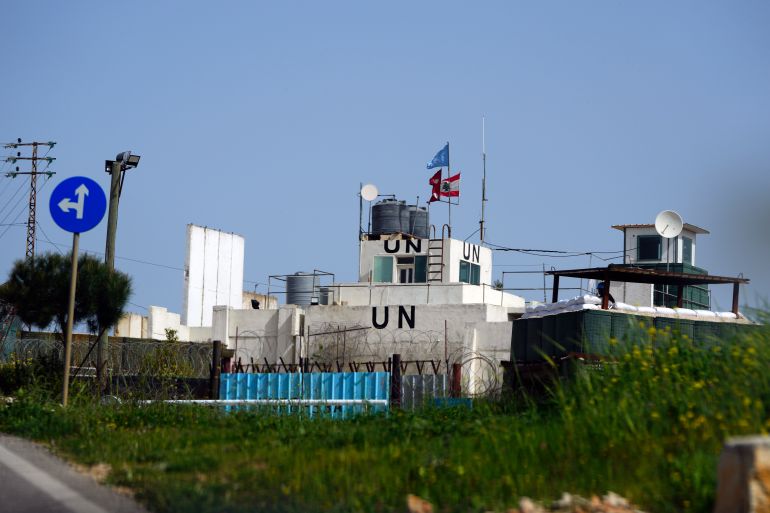UN observers wounded in explosion while on patrol in southern Lebanon
UN mission in Lebanon says targeting of peacekeepers ‘unacceptable’ as Israeli military denies striking area.

Three United Nations military observers and a Lebanese translator were wounded while patrolling the border in southern Lebanon when a shell exploded near them, the UN peacekeeping mission said.
The blast took place in Rmeish, a village along the Israel-Lebanon border, on Saturday.
Keep reading
list of 4 itemsIsrael’s toxic legacy: Bombing southern Lebanon with white phosphorus
Israeli strike killed ‘clearly identifiable’ reporter in Lebanon: UN probe
Hezbollah fires rockets into Israel after deadly strikes
The observers are part of the UN Truce Supervision Organization (UNTSO), which supports the UN peacekeeping mission in southern Lebanon, UNIFIL.
Three UNTSO “military observers and one Lebanese language assistant on a foot patrol along the Blue Line were injured when an explosion occurred near their location”, UNIFIL spokesperson Andrea Tenenti said in a statement.
The wounded were evacuated for medical treatment and are in “stable” condition, she added in a subsequent statement, identifying the observers as a Norwegian, an Australian and a Chilean.
UNIFIL is “investigating the origin of the explosion”, Tenenti said.
“Safety and security of UN personnel must be guaranteed,” the UNIFIL statement said, urging “all actors to cease the current heavy exchanges of fire before more people are unnecessarily hurt”.
“The targeting of peacekeepers is unacceptable,” a UNTSO statement added.
The Israeli military and Lebanese group Hezbollah, an ally of Hamas, have been exchanging near-daily fire across the border since October when the current conflict in Gaza started.
“All actors have a responsibility under international humanitarian law to ensure protection to non-combatants, including peacekeepers, journalists, medical personnel, and civilians,” UNTSO said. “We repeat our call for all actors to cease the current heavy exchanges of fire before more people are unnecessarily hurt.”
Two security sources told the Reuters news agency that the observers were wounded in an Israeli attack, and Lebanon’s state-run National News Agency said an “enemy [Israeli] drone” had raided the Rmeish area.
But the Israeli military denied targeting the area. “Contrary to the reports, the [Israeli military] did not strike a UNIFIL vehicle in the area of Rmeish this morning,” it said.
UN staff ‘targeted’
Reporting from Beirut, Al Jazeera’s Zeina Khodr said the UN observers and translator were “close to the blue line, the border between Lebanon and Israel” when the explosion took place.
The incident was “another dangerous development in a simmering conflict, which is now at its sixth month between Israel and Hezbollah”, she added.
Lebanon’s caretaker Prime Minister Najib Mikati spoke to UNIFIL commander Aroldo Lozaro, condemning the “targeting” of UN staff, according to a statement from his office.
Lebanon’s foreign ministry said the attack was “in violation of international law”.
Israel’s shelling of Lebanon has killed nearly 270 Hezbollah fighters, but it has also killed about 50 civilians – including children, medics and journalists – and hit both UNIFIL and the Lebanese army.
In November, UNIFIL said one of its patrols was targeted by Israeli gunfire in southern Lebanon, but there were no casualties.
UNIFIL last month said the Israeli military violated international law by firing on a group of clearly identifiable journalists, killing a Reuters journalist.
UNIFIL was set up in 1978 to monitor the withdrawal of Israeli forces after they invaded Lebanon in reprisal for a Palestinian attack.
It was bolstered after the conflict between Hezbollah and Israel in 2006, and its roughly 10,000 peacekeepers are tasked with monitoring the ceasefire between the two sides.